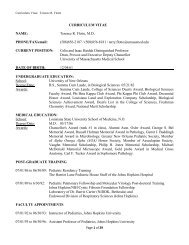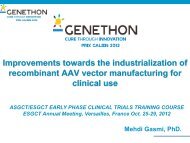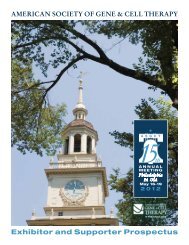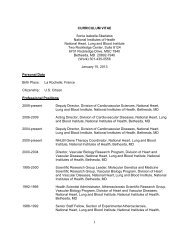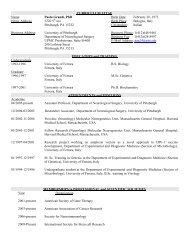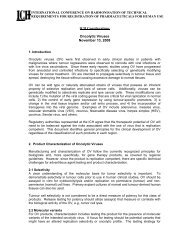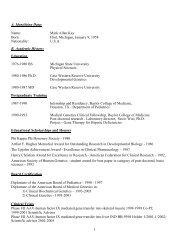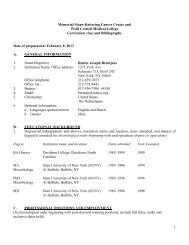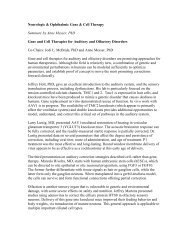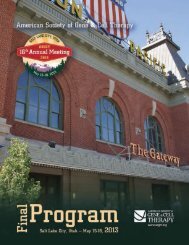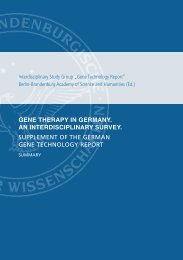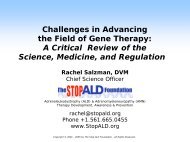13 th AnnUAL MEETing | Washington, DC USA May 19-22, 2010 47Program ScheduleCatherine McKeon, PhDPThe NIDDK Molecular <strong>Therapy</strong> Centers and <strong>Cell</strong> <strong>Therapy</strong> ProgramThis presentation will cover the NIDDK Molecular <strong>Therapy</strong> Centers and the <strong>Cell</strong> <strong>Therapy</strong> Program, as well as some other programs that <strong>of</strong>fer resources to investigators.David G. Badman, PhDThe NIH Rapid Access to Interventional Development Program (NIH-RAID)The NIH Roadmap has established the NIH-RAID Program (Rapid Access to Interventional Development), to make available, on a competitive basis, critical resourcesneeded for development <strong>of</strong> new small molecule or natural product-derived therapeutic agents. This program, part <strong>of</strong> the Translational Research component <strong>of</strong> Reengineeringthe Clinical Research Enterprise, uses resources <strong>of</strong> the National Cancer Institute’s (NCI) Developmental Therapeutics Program and the National Heart Lung and BloodInstitute’s (NHLBI) <strong>Gene</strong> <strong>Therapy</strong> Resource Program. Services provided depend upon the project and strength <strong>of</strong> the preliminary data. Services potentially available include:bulk supply, GMP manufacturing, formulation, assay development suitable for pharmacokinetic testing, and animal toxicology. Assistance also can be provided in the regulatoryprocess. Currently, animal efficacy studies are not supported; neither are syntheses nor formulation <strong>of</strong> recombinant proteins or monoclonal antibodies. However, theNIH-RAID Pilot will consider requests for services to support later-stage preclinical development <strong>of</strong> these entities. Manufacture <strong>of</strong> certain gene vectors (non-GMP viral andnon-viral gene vectors and GMP-grade adeno-associated virus and lentivirus vectors) can be requested, and preclinical studies <strong>of</strong> vectors may be supported. Additionally, theNIH-RAID Pilot will now consider requests for manufacture <strong>of</strong> small molecule or natural product material for any clinical study. Proposals must originate from academic ornon-pr<strong>of</strong>it investigators, as well as companies eligible for Small Business Innovation Research Program (SBIR). Collaboration with larger industry partners is encouraged.Roy S. Wu, PhDThe NCI Experimental Therapeutics Program (NExT) and the Chemical Biology Consortium (CBC)The NCI has recently consolidated their drug discovery and development efforts into a single pipeline for increased timeliness and efficiency and with an emphasis onunmet clinical needs. Researchers in academia, government or industry, either nationally or internationally, may apply. NCI is committed to moving high-priority discoveryand development projects through to pro<strong>of</strong>-<strong>of</strong>-concept clinical trials in a partnership relationship. NExT is not a grant or contract mechanism <strong>of</strong> support. Rather, projectswill be evaluated and ranked by a peer committee followed by internal committees that will assess clinical need, develop project budgets and milestones with go/no godecisions, and provide access to the NCI’s drug discovery and preclinical and clinical development resources at no cost to the applicant. The resources include activities suchas production <strong>of</strong> pharmaceutical-grade material, development <strong>of</strong> clinical formulations, and first-in-human studies. The discovery arm <strong>of</strong> NExT, known as the NCI ChemicalBiology Consortium or CBC, is a collaborative network <strong>of</strong> 12 Centers that provide access to high-throughput screens and chemistry to optimize compounds for human use.Applications for potential NExT projects are accepted online four times a year. Visit http://next.cancer.gov/ for application instructions and more information.Danilo A. Tagle, PhDThe NINDS Translational Research ProgramThe NINDS Translational Research Program is specifically focused on pre-clinical therapy development necessary to begin clinical testing <strong>of</strong> therapeutic candidates forneurological disorders. This program supports the pre-clinical development <strong>of</strong> drugs, biologics, and devices including activities that lead to Investigational New Drug (IND)or Investigational Device Exemptions (IDE) applications to the Food and Drug Administration (FDA). Supported projects can include lead optimization, pre-clinical efficacytesting, predictive ADMET (absorption, distribution, metabolism, excretion, and toxicology) testing, formulation, manufacture, pharmacology, toxicology, and IND or IDEsubmission. For entry to the program, projects must have one or more identified therapeutic leads and convincing pro<strong>of</strong>-<strong>of</strong>-principle on efficacy demonstrated in crediblemodels <strong>of</strong> the disease or against defined disease targets.Thursday, May 20 thLisbeth Welniak, PhDProduction Assistance for <strong>Cell</strong>ular Therapies (PACT)The PACT Group is an NHLBI-funded initiative that is committed to the advancement <strong>of</strong> effective cell therapies. This program was renewed in January, 2010 for a secondfive-year period <strong>of</strong> funding. PACT supports the development <strong>of</strong> novel somatic cell therapy products by providing production assistance to the cell therapy community, aswell as educational training via web seminars and at meetings. Production assistance is provided through the funded contract manufacturing <strong>of</strong> therapeutic cell products atPACT processing facilities. These facilities <strong>of</strong>fer scale-up capability and expertise in the translational development needed to produce cell therapy products under cGMP andcGTP regulations. PACT’s educational training focuses on three general areas: translational development/scale-up and manufacture <strong>of</strong> cell therapy products; and qualityassurance and regulatory issues. The objective <strong>of</strong> the PACT program is to continue to advance cellular therapy research in the areas <strong>of</strong> regeneration <strong>of</strong> damaged/diseasedtissues, organs, and biologic systems, and targeted treatments for serious diseases without effective therapies. The cell processing facilities will support translationalresearch in novel cell therapies to advance the field <strong>of</strong> cellular therapy and to enable scientifically meritorious basic science research to reach the clinical trial stage. Pleasevisit the PACT website at www.pactgroup.net for more information regarding the PACT program.
48<strong>American</strong> <strong>Society</strong> <strong>of</strong> <strong>Gene</strong> & <strong>Cell</strong> <strong>Therapy</strong>Program ScheduleThursday, May 20 thSonia Skarlatos, PhDThe Center for Fetal Monkey <strong>Gene</strong> Transfer for Heart, Lung, and Blood DiseasesAnother unique resource that NHLBI <strong>of</strong>fers to gene therapy researchers is the Center for Fetal Monkey <strong>Gene</strong> Transfer for Heart, Lung, and Blood Diseases at the University<strong>of</strong> California, Davis (http://www.cfmgt.ucdavis.edu/). Established in 2001, this program provides NHLBI-funded investigators with essential expertise, services, andresources to evaluate the safety and efficacy <strong>of</strong> gene transfer strategies as they emerge.The NHLBI <strong>Gene</strong> <strong>Therapy</strong> Resource Program (GTRP)The NHLBI <strong>Gene</strong> <strong>Therapy</strong> Resource Program (GTRP) was initiated in March 2007 and since that time it has become a very active and valuable program. The program<strong>of</strong>fers several services at no cost to investigators researching gene therapy for heart, lung, and blood disorders. The GTRP includes four core labs to assist researchers withpreclinical vector production, pharmacology and toxicology testing, and production <strong>of</strong> clinical-grade AAV and lentiviral vectors. Additionally, there is a Clinical CoordinatingCenter to assist both investigators and the NHLBI in all aspects <strong>of</strong> the program.The Science Moving Towards Research Translation and <strong>Therapy</strong> (SMARTT) ProgramThe purpose <strong>of</strong> the SMARTT program is to assist translation to the clinic <strong>of</strong> novel synthetic, natural, or biologic therapeutic interventions arising in the scientific communityfor the treatment <strong>of</strong> heart, lung, and blood diseases. SMARTT will provide resources in the areas <strong>of</strong> preclinical and clinical-grade production and testing for biologics, nonbiologicsand small molecules in accordance with Good Manufacturing Practices (GMP), and in the conduct <strong>of</strong> pharmacology/toxicology studies. In addition, SMARTT willprovide regulatory assistance to investigators wishing to conduct early stage clinical trials.Ying Huang, PhDCommunication with FDA/CBER/OCTGT (Office <strong>of</strong> <strong>Cell</strong>ular, Tissue and <strong>Gene</strong> Therapies) Open Microphone Question and Answer PeriodThis talk will introduce the audience to the pathways that are currently available in CBER/OCTGT to facilitate communication between CBER and the sponsor <strong>of</strong> an investigationalcellular or gene therapy product to enable the conduct <strong>of</strong> safe clinical trials. This talk will briefly touch upon the various disciplines involved in the developmentprogram <strong>of</strong> these novel products, with a focus towards supporting translation from bench to bedside.Open Microphone Question and Answer PeriodLunch Break12:30 pm – 2:00 pmMeet-the-Investigator Lunch 22012:30 pm - 1:45 pmRoom: HardingMusculo-SkeletalSpeakersJeffrey Chamberlain, PhD & Paula Clemens, MDMeet-the-Investigator Lunch 22112:30 pm - 1:45 pmRoom: HooverCancer Stem <strong>Cell</strong>sSpeakersTimothy P. Cripe, MD, PhD & Samuel D. Rabkin, PhDEXHIBITOR PROSPECTUSfinal program
- Page 1 and 2: FINAL PROGRAMAmerican Society of Ge
- Page 4: 13 th AnnUAL MEETing | Washington,
- Page 7 and 8: 6American Society of Gene & Cell Th
- Page 12 and 13: 13 th AnnUAL MEETing | Washington,
- Page 20 and 21: 13 th AnnUAL MEETing | Washington,
- Page 22 and 23: 13 th AnnUAL MEETing | Washington,
- Page 24 and 25: 13 th AnnUAL MEETing | Washington,
- Page 26 and 27: 13 th AnnUAL MEETing | Washington,
- Page 28 and 29: 13 th AnnUAL MEETing | Washington,
- Page 30 and 31: 13 th AnnUAL MEETing | Washington,
- Page 32 and 33: 13 th AnnUAL MEETing | Washington,
- Page 34 and 35: 13 th AnnUAL MEETing | Washington,
- Page 36 and 37: 13 th AnnUAL MEETing | Washington,
- Page 38 and 39: 13 th AnnUAL MEETing | Washington,
- Page 40 and 41: 13 th AnnUAL MEETing | Washington,
- Page 42 and 43: 13 th AnnUAL MEETing | Washington,
- Page 44 and 45: 13 th AnnUAL MEETing | Washington,
- Page 46 and 47: 13 th AnnUAL MEETing | Washington,
- Page 50 and 51: 13 th AnnUAL MEETing | Washington,
- Page 52 and 53: 13 th AnnUAL MEETing | Washington,
- Page 54 and 55: 13 th AnnUAL MEETing | Washington,
- Page 56 and 57: 13 th AnnUAL MEETing | Washington,
- Page 58 and 59: 13 th AnnUAL MEETing | Washington,
- Page 60 and 61: 13 th AnnUAL MEETing | Washington,
- Page 62 and 63: 13 th AnnUAL MEETing | Washington,
- Page 64 and 65: 13 th AnnUAL MEETing | Washington,
- Page 66 and 67: 13 th AnnUAL MEETing | Washington,
- Page 68 and 69: 13 th AnnUAL MEETing | Washington,
- Page 70 and 71: 13 th AnnUAL MEETing | Washington,
- Page 72 and 73: 13 th AnnUAL MEETing | Washington,
- Page 74 and 75: 13 th AnnUAL MEETing | Washington,
- Page 76 and 77: 13 th AnnUAL MEETing | Washington,
- Page 78 and 79: 13 th AnnUAL MEETing | Washington,
- Page 80 and 81: 13 th AnnUAL MEETing | Washington,
- Page 82 and 83: 13 th AnnUAL MEETing | Washington,
- Page 84 and 85: 13 th AnnUAL MEETing | Washington,
- Page 86 and 87: 13 th AnnUAL MEETing | Washington,
- Page 88 and 89: 13 th AnnUAL MEETing | Washington,
- Page 90 and 91: 13 th AnnUAL MEETing | Washington,
- Page 92 and 93: 13 th AnnUAL MEETing | Washington,
- Page 94 and 95: 13 th AnnUAL MEETing | Washington,
- Page 96 and 97: 13 th AnnUAL MEETing | Washington,
- Page 98 and 99:
13 th AnnUAL MEETing | Washington,
- Page 100 and 101:
13 th AnnUAL MEETing | Washington,
- Page 102 and 103:
13 th AnnUAL MEETing | Washington,
- Page 104 and 105:
13 th AnnUAL MEETing | Washington,
- Page 106 and 107:
13 th AnnUAL MEETing | Washington,
- Page 108 and 109:
13 th AnnUAL MEETing | Washington,
- Page 110 and 111:
13 th AnnUAL MEETing | Washington,
- Page 112 and 113:
13 th AnnUAL MEETing | Washington,
- Page 114 and 115:
13 th AnnUAL MEETing | Washington,
- Page 116 and 117:
13 th AnnUAL MEETing | Washington,
- Page 118 and 119:
13 th AnnUAL MEETing | Washington,
- Page 120 and 121:
13 th AnnUAL MEETing | Washington,
- Page 122 and 123:
13 th AnnUAL MEETing | Washington,
- Page 124 and 125:
13 th AnnUAL MEETing | Washington,
- Page 127 and 128:
126American Society of Gene & Cell
- Page 129 and 130:
128American Society of Gene & Cell
- Page 131 and 132:
130American Society of Gene & Cell
- Page 133 and 134:
132American Society of Gene & Cell
- Page 135 and 136:
134American Society of Gene & Cell
- Page 137 and 138:
136American Society of Gene & Cell
- Page 139 and 140:
138American Society of Gene & Cell
- Page 141 and 142:
140American Society of Gene & Cell
- Page 143 and 144:
142American Society of Gene & Cell
- Page 145 and 146:
144American Society of Gene & Cell
- Page 147 and 148:
146American Society of Gene & Cell
- Page 149 and 150:
148American Society of Gene & Cell
- Page 151 and 152:
150American Society of Gene & Cell
- Page 153 and 154:
152American Society of Gene & Cell
- Page 155 and 156:
154American Society of Gene & Cell
- Page 157 and 158:
156American Society of Gene & Cell
- Page 159 and 160:
158American Society of Gene & Cell
- Page 161 and 162:
160American Society of Gene & Cell
- Page 163 and 164:
162American Society of Gene & Cell
- Page 165 and 166:
164American Society of Gene & Cell
- Page 167 and 168:
166American Society of Gene & Cell
- Page 169 and 170:
168American Society of Gene & Cell
- Page 171 and 172:
170American Society of Gene & Cell
- Page 173 and 174:
172American Society of Gene & Cell
- Page 175 and 176:
174American Society of Gene & Cell
- Page 177 and 178:
176American Society of Gene & Cell
- Page 179 and 180:
178American Society of Gene & Cell
- Page 181 and 182:
180American Society of Gene & Cell
- Page 183 and 184:
182American Society of Gene & Cell
- Page 185 and 186:
184American Society of Gene & Cell
- Page 187 and 188:
186American Society of Gene & Cell



